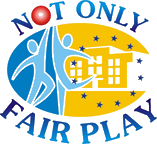
- Home
- Best
Practices - Toolkits
How to ... - Sport
Events - Guidelines
- Information
& Contacts - Project Management
A collection of student stories and initiatives about sport.
This section offers access to a collection of toolkits to promote sport at school.
-
 Physical Education Teachers
They are the main point of reference for students at school
Physical Education Teachers
They are the main point of reference for students at school
-
 Teachers
Teachers of all subjects can contribute to promote sport at school
Teachers
Teachers of all subjects can contribute to promote sport at school
-
 School Directors
Their support is a key element to promote sport at school
School Directors
Their support is a key element to promote sport at school
-
 Resources
A database of resources for teachers, PE teachers and school directors for the promotion of sport at school.
Resources
A database of resources for teachers, PE teachers and school directors for the promotion of sport at school.
Sporting events are organised in each partner country
Guidelines for policy makers willing to raise awareness on the importance of promoting sport in schools
Events
The Not Only Fair Play project has been promoted through conferences and articles.
Partnership
-
 Contractual Partners
From this section it is possible to access a description of each contractual partner of the Not Only Fair Play project.
Contractual Partners
From this section it is possible to access a description of each contractual partner of the Not Only Fair Play project.
-
 Schools
From this section it is possible to access information about the schools involved in the Not Only Fair Play Project in the 9 European countries involved.
Schools
From this section it is possible to access information about the schools involved in the Not Only Fair Play Project in the 9 European countries involved.
-
 Associated Partners
A number of associated partners officially joined the project in order to ensure the project sustainability by continuing to use the project deliverables over the next years.
Associated Partners
A number of associated partners officially joined the project in order to ensure the project sustainability by continuing to use the project deliverables over the next years.
This section of the Not Only Fair Play portal provides administrative information for the project contractual partners and for the European Commission, and is password protected.
Physical Education Teachers
Homepage > Toolkits > Physical Education Teachers

They are the main point of reference for students at school
Back to the Physical Education Teachers Toolkits
Promotion of an ethical approach to sport, including communication strategies with parents
A Toolkit for Physical Education Teacher
This step provides teachers with online material on several codes, which are intended to encourage teachers to adopt an informed approach to their teaching and contexts and to reflect on the good and correct practices as professional teachers. A teacher shall endeavour to be a role model and shall act within the community in a manner which enhances the prestige of the profession.
- Peter Arnold, Sport, Ethics and EducationThe book promotes sport as an aspect of liberal education, a practice concerned with fairness.
- Irish Sports Council - Sample Lesson PlanThe purpose of this lesson is to introduce students to the concept of the sport values and help students acquire knowledge of these sport principles within the context of sport and physical activity and make connections between sport values and other aspects of the students’ lives.
- Personal Genetics Education ProjectThe site presents interactive lessons for high school and college educators to engage their students in discussions of ethics and personal genetics. The lessons are relevant to multiple subjects, including biology, health, social studies, law, physical education and psychology. All of our lesson plans contain background reading for teachers and students, a selection of classroom activities, discussion points, in some cases a slide presentation or video clip, and an evaluation. Each lesson can stand alone, or all the lessons can be taught as a unit.
- Muriel Poisson, Guidelines for the design and effective use of teachers’ codes of conductThe booklet focuses on teachers’ codes of conduct, set with a view to enhance the professionalism of teachers and quality of education.
- The Council for the Teaching Profession in Malta, Teachers’ Code of Ethics and PracticeThe Code presents the Key Principles, which define the interactions between each individual educator and students, their parents, the authorities and members of other multi-disciplinary teams. The education of the nation’s children has been entrusted in our care and this places all of us, whatever our role is, in a very special position of responsibility which requires of us very high standards of behaviour and conduct.
- Teachers’ code of professional practiceThe Code sets out the five principles of public service ethics that should guide the work of all teachers in meeting the educational needs of their students.


